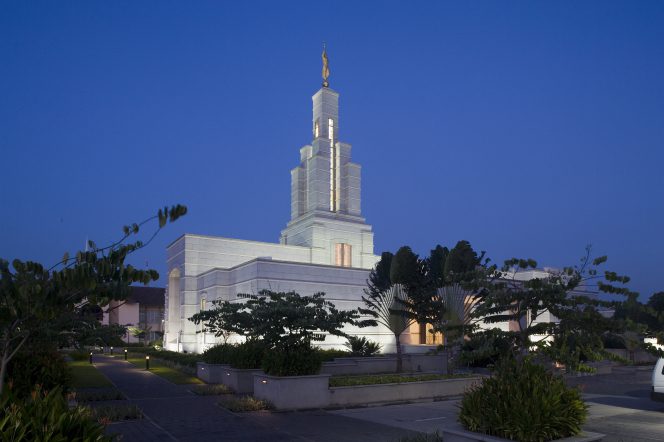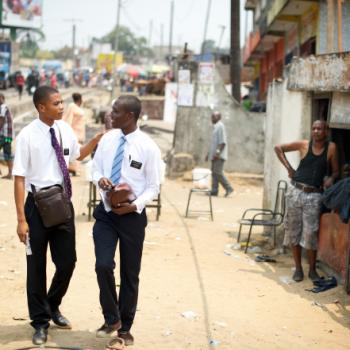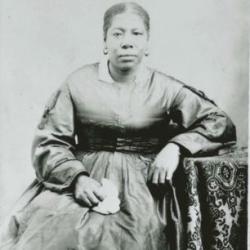
Apparently, BYU’s male a capella group, Vocal Point, was featured on a recent CNN program memorializing victims of the coronavirus pandemic. They sang “Be Thou My Vision.” Here’s an earlier recording of them performing that beautiful song:
“Be Thou My Vision” (BYU Vocal Point)
It’s a popular piece on the campus of Brigham Young University. At least, it’s popular when there are people on campus. Here, for example, is a rendition of the same song by BYU’s female a capella ensemble, Noteworthy:
“Be Thou My Vision” (BYU Noteworthy, featuring Keith Goodrich on violin)
Unfortunately, Vocal Point’s rendition of the song on CNN displeased at least a few viewers. How dare a Latter-day Saint group sing a Christian song! Obviously, it was part of our devious ongoing campaign to masquerade as Christians.
Here’s one version of the lyrics to “Be Thou My Vision”:
Naught be all else to me, save that Thou art
Thou my best Thought, by day or by night
Waking or sleeping, Thy presence my light
I ever with Thee and Thou with me, Lord
Thou my great Father, I Thy true son
Thou in me dwelling, and I with Thee one
Thou mine Inheritance, now and always
Thou and Thou only, first in my heart
High King of Heaven, my Treasure Thou art
May I reach Heaven’s joys, O bright Heav’n’s Sun
Heart of my own heart, whate’er befall
Still be my Vision, O Ruler of all
There is nothing in those words — nothing — that is theologically foreign to us. And we aren’t pretending to be Christians. We are Christians.
***
Yesterday, I called attention to President Russell M. Nelson’s Facebook message condemning racism and violence. It also included the following passage:
Illegal acts such as looting, defacing, or destroying public or private property cannot be tolerated. Never has one wrong been corrected by a second wrong. Evil has never been resolved by more evil.
He has been roundly attacked for having said that, as if looting and the destruction of property should be tolerated. In fact, he was accused of displaying “white privilege” for saying it. So I wonder whether these two items, in their rejection of violence and destruction, also reflect “white privilege.” The second was brought to my notice by Tarik LaCour:
“Former President Obama: ‘Let’s Not Excuse Violence … Or Participate In It'”
“Angry Baltimore mom beats son after seeing him throw rocks at police”
Beyond their obvious toll in lives and livelihoods, violence and the destruction of property only muddy the moral waters in cases like this. And, very commonly, it’s minority-owned businesses that sustain most of the damage and mostly-minority neighborhoods that must live with the lasting consequences. President Obama’s statement mentions this, and there are many similar reports. The 1992 riots in Los Angeles in the wake of the arrest and beating of Rodney King, for example, left 63 people dead, 2,383 injured, and estimates of property damage exceeding $1 billion, much of it in LA’s Koreatown. How can that be justified?
I can’t say that the term white privilege is always used as an illegitimate rhetorical device, and there is certainly still plenty of evidence that black people are sometimes disadvantaged in unfair ways. (So, for that matter, though seldom in such serious respects, are short people and unattractive people. We live in a fallen world.) But it seems to me that white privilege is often weaponized, deployed as a way of silencing or marginalizing those who don’t toe the required ideological party line or voice the correct shibboleths. It stigmatizes them as morally defective. But that seems to me illegitimate and, yes, divisive — an example of the very divisiveness that the current street protests are plainly telling us to surrender.
It would be so wonderful if we could all come together. With that in mind, I bring you an item that goes all the way back to the halcyon pre-riot and pre-plague era of July 2019. Several people have reminded me of it, and rightly so. At an exceptionally difficult moment in an unusually difficult year, it’s worth watching, and even (if you’ve already seen it) worth watching again:












